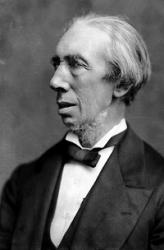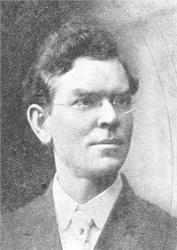Planning worship?
Check out our sister site, ZeteoSearch.org,
for 20+ additional resources related to your search.
- |
User Links
Person Results
George A. Macfarren

1813 - 1887 Person Name: George A. MacFarren, d. 1887 Scripture: Psalm 92 Composer of "[It is a good thing to give thanks unto the Lord]" in The Lutheran Hymnal George Alexander Macfarren, Mus. Doc.; b. London, 1813; d. London, 1887
Evangelical Lutheran Hymnal, 1908
=======================
Born: March 2, 1813, Westminster, England.
Died: October 31, 1887, St. Marylebone, England.
Buried: Hampstead Cemetery, London, England.
Brother of Walter Macfarren, George was a principal of the Royal Academy of Music; professor at Cambridge University; conductor at Covent Garden, London; program note writer for the Philharmonic Society; and editor of Handel and Purcell. He wrote 18 operas, 13 oratorios and cantatas, 9 symphonies, and 162 songs. He went blind in 1860, and was knighted in 1883.
Sources:
Frost, p. 681
Lightwood, p. 189
Nutter, p. 460
http://www.hymntime.com/tch/bio/m/a/c/macfarren_ga.htm
===============================
http://en.wikipedia.org/wiki/George_Alexander_Macfarren
George A. Macfarren
John Jones
1728 - 1796 Person Name: J. Jones Scripture: Psalm 92:12-15 Composer of "[It is a good thing to give thanks unto the Lord]" in The Methodist Hymn-Book with Tunes
John Jones
William Crotch

1775 - 1847 Person Name: W. Crotch Scripture: Psalm 92:12-15 Composer of "[It is a good thing to give thanks unto the Lord]" in The Methodist Hymn-Book with Tunes William Crotch (5 July 1775 – 29 December 1847) was an English composer, organist and artist.
Born in Norwich, Norfolk to a master carpenter he showed early musical talent as a child prodigy. The three and a half year old Master William Crotch was taken to London by his ambitious mother, where he not only played on the organ of the Chapel Royal in St James's Palace, but for King George III. The London Magazine of April 1779 records:
He appears to be fondest of solemn tunes and church musick, particularly the 104th Psalm. As soon as he has finished a regular tune, or part of a tune, or played some little fancy notes of his own, he stops, and has some of the pranks of a wanton boy; some of the company then generally give him a cake, an apple, or an orange, to induce him to play again...
Crotch was later to observe that this experience led him to become a rather spoiled child, excessively indulged so that he would perform.
He was for a time organist at Christ Church, Oxford, from which he was later to graduate with a Bachelor of Music degree.
His composition The Captivity of Judah was played at Trinity Hall, Cambridge, on 4 June 1789; his most successful composition in adulthood was the oratorio Palestine (1812). He may have composed the Westminster Chimes in 1793.
In 1797 Crotch was given a professorship at Oxford University, and in 1799 he acquired a doctorate in music. While at Oxford, he became acquainted with the musician and artist John Malchair, and took up sketching. He followed Malchair's style in recording the exact time and date of each of his pictures, and when he met John Constable in London in 1805, he passed the habit along to the more famous artist.
In 1834, to commemorate the installation of the Duke of Wellington as chancellor of the University of Oxford, Crotch penned a second oratorio titled The Captivity of Judah. The 1834 work bears little resemblance to the oratorio he wrote as a child in 1789.
In 1822, Crotch was appointed to the Royal Academy of Music as its first Principal, but resigned ten years later.[2] He spent his last years at his son's house in Taunton, Somerset, where he died suddenly in 1847. Among his notable pupils were William Sterndale Bennett, Lucy Anderson, Stephen Codman, George Job Elvey, Cipriani Potter, and Charles Kensington Salaman
--en.wikipedia.org/
William Crotch
Cyrus S. Nusbaum

1861 - 1937 Person Name: C. S. N. Scripture: Psalms 1-150 Author of "His Way with Thee" in New Songs of the Gospel No. 2 Rv Cyrus Sylvester Nusbaum DD USA 1861-1937. Born at Middlebury, IN, he completed his education and taught school in Marion County, KS. In 1886 he married Harriett Eleanor Erwin, and they had two children: Hazel and Mark. That year he was ordained a Methodist minister and pastored at Douglass, Goddard, Wichita, and Kingman, KS. He served as educational secretary at Southwestern College, Winfield, KS, 1895-1897. He pastored at Ottawa, KS, 1897-1903. He became presiding elder of the Independent District, 1903-1907, and pastor at Parsons, KS, 1908-1914. In 1914 he was appointed an evangelist for the Methodist Conference. During WW1 he was a US Army Captain working as an American Red Cross inspector in France. After the war, he often spoke on the Redpath Lyceum circuit and held evangelistic meetings in KS, NE, OK, and TX. Southwestern College conferred a DD degree upon him. In latter years, he served small KS churches and was a “supply preacher” at Lost Springs and Antelope. He died at Wichita, and was buried in Kingman, KS.
Special note: His hymn, noted below, was written after his first year of trying to preach at seven different locations simultaneously on a very low salary, a very difficult task. He was tired and discouraged. At the annual conference meeting he was hoping for a better appointment, but was reassigned to the same circuit. He was unhappy and rebellious in spirit about it, but, upon retiring at the lodging place for the night, he stayed up late after his wife had retired for the night. About midnight he knelt in prayer and told God he could have his way regardless of the cost. It inspired him to write the hymn (both words and music).
John Perry
Cyrus S. Nusbaum
Peter Abelard

1079 - 1142 Person Name: Peter Abelard, 1079-1142 Scripture: Psalm 92 Author of "Oh what their joy and their glory must be" in The Book of Praise Abelard, Peter, born at Pailais, in Brittany, 1079. Designed for the military profession, he followed those of philosophy and theology. His life was one of strange chances and changes, brought about mainly through his love for Heloise, the niece of one Fulbert, a Canon of the Cathedral of Paris, and by his rationalistic views. Although a priest, he married Heloise privately. He was condemned for heresy by the Council of Soissons, 1121, and again by that of Sens, 1140; died at St. Marcel, near Chalons-sur-Saône, April 21, 1142. For a long time, although his poetry had been referred to both by himself and by Heloise, little of any moment was known except the Advent hymn, Mittit ad Virginem, (q.v.). In 1838 Greith published in his Spicihgium Vaticanum, pp. 123-131, six poems which had been discovered in the Vatican. Later on, ninety-seven hymns were found in the Royal Library at Brussels, and pub. in the complete edition of Abelard's works, by Cousin, Petri Abelardi Opp., Paris, 1849. In that work is one of his best-known hymns, Tuba Domini, Paule, maxima (q.v.). Trench in his Sacra Latina Poetry, 1864, gives his Ornarunt terram germina (one of a series of poems on the successive days' work of the Creation), from Du Meril's Poesies Popul. Lat. du Moyen Age, 1847, p. 444.
-John Julian, Dictionary of Hymnology (1907)
Peter Abelard
John Bacchus Dykes

1823 - 1876 Person Name: John Bacchus Dykes, 1823-1876 Scripture: Psalm 92 Harmonizer of "O QUANTA QUALIA" in The Book of Praise As a young child John Bacchus Dykes (b. Kingston-upon-Hull' England, 1823; d. Ticehurst, Sussex, England, 1876) took violin and piano lessons. At the age of ten he became the organist of St. John's in Hull, where his grandfather was vicar. After receiving a classics degree from St. Catherine College, Cambridge, England, he was ordained in the Church of England in 1847. In 1849 he became the precentor and choir director at Durham Cathedral, where he introduced reforms in the choir by insisting on consistent attendance, increasing rehearsals, and initiating music festivals. He served the parish of St. Oswald in Durham from 1862 until the year of his death. To the chagrin of his bishop, Dykes favored the high church practices associated with the Oxford Movement (choir robes, incense, and the like). A number of his three hundred hymn tunes are still respected as durable examples of Victorian hymnody. Most of his tunes were first published in Chope's Congregational Hymn and Tune Book (1857) and in early editions of the famous British hymnal, Hymns Ancient and Modern.
Bert Polman
John Bacchus Dykes
Mrs. C. H. Morris

1862 - 1929 Person Name: L. N. M. Scripture: Psalm 92:12-14 Author of "Sweeter as the Years Go By" in Timeless Truths Lelia (Mrs. C.H.) Morris (1862-1929) was born in Pennsville, Morgan County, Ohio. When her family moved to Malta on the Muskingum River she and her sister and mother had a millinery shop in McConnelsville. She and her husband Charles H. Morris were active in the Methodist Episcopal Church and at the camp meetings in Sebring and Mt. Vernon. She wrote hymns as she did her housework. Although she became blind at age 52 she continued to write hymns on a 28-foot long blackboard that her family had built for her. She is said to have written 1000 texts and many tunes including "Sweeter as the years go by."
Mary Louise VanDyke
Mrs. C. H. Morris
Morgan F. Simmons
b. 1929 Person Name: Morgan Simmons Scripture: Psalm 92 Composer of "GRACE ABUNDANT" in In Melody and Songs SIMMONS, MORGAN
Morgan F. Simmons
Carolina Sandell

1823 - 1903 Person Name: Lina Sandell, 1832-1903 Scripture: Psalm 92:12-13 Author of "Children of the Heavenly Father" in The Covenant Hymnal Caroline W. Sandell Berg (b. Froderyd, Sweden, 1832; d. Stockholm, Sweden, 1903), is better known as Lina Sandell, the "Fanny Crosby of Sweden."
"Lina" Wilhelmina Sandell Berg was the daughter of a Lutheran pastor to whom she was very close; she wrote hymns partly to cope with the fact that she witnessed his tragic death by drowning. Many of her 650 hymns were used in the revival services of Carl O. Rosenius, and a number of them gained popularity particularly because of the musical settings written by gospel singer Oskar Ahnfelt. Jenny Lind, the famous Swedish soprano, underwrote the cost of publishing a collection of Ahnfelt's music, Andeliga Sänger (1850), which consisted mainly of Berg's hymn texts.
Bert Polman
Carolina Sandell
Ernst W. Olson

1870 - 1958 Person Name: Ernst W. Olson, 1870-1958 Scripture: Psalm 92:12-13 Translator of "Children of the Heavenly Father" in The Covenant Hymnal Ernst W. Olson (b. Skane, Sweden, 1870; d. Chicago, IL, 1958) prepared the English translation for the 1925 Hymnal of the Lutheran Augustana Synod. As editor, writer, poet, and translator, Olson made a valuable contribution to Swedish-American culture and to church music. His family immigrated to Nebraska when he was five years old, but he spent much of his life in the Chicago area. Educated at Augustana College, Rock Island, Illinois, he was editor of several Swedish-American newspapers and spent most of his professional career as an editor for the Augustana Book Concern (1911-1949). Olson wrote History of the Swedes in Illinois (1908). He also contributed four original hymns and twenty-eight translations to The Hymnal (1925) of the Evangelical Lutheran Augustana Synod and served on the committee that produced the Lutheran Service Book and Hymnal (1958).
Bert Polman
Ernst W. Olson


 My Starred Hymns
My Starred Hymns


